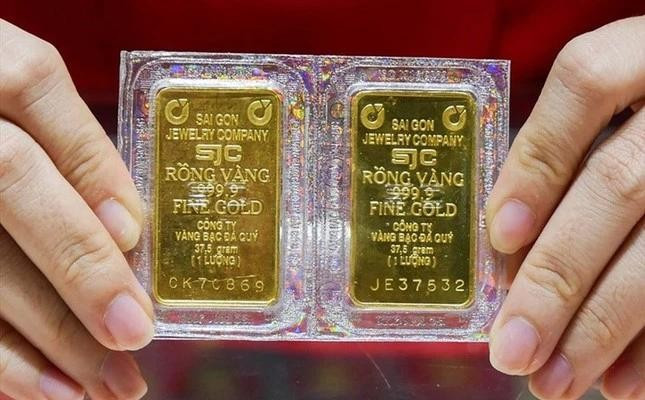
The Government Electronic Information Portal today organized a seminar on solutions to develop a safe and sustainable gold market to listen to opinions and analysis of solutions for gold market management.
Speaking at the seminar, Professor Hoang Van Cuong, Vice Rector of the National Economics University, a member of the National Assembly's Finance and Budget Committee, said that Decree No. 24/`2012/ND-CP on management Gold business management was established in 2012 when gold was being considered as a means of payment, almost like consuming gold instead of money. If that situation continues at this moment, it will cause many consequences, especially the inability to manage import-export and foreign exchange issues; thereby, making it impossible to manage the exchange rate issue, and losing the value of the currency.
In that context, the Government issued Decree No. 24/2012/ND-CP to address the use of gold as a trading tool.
However, according to Professor Cuong, now the situation has changed a lot. The Decree No. 24/2012/ND-CP stipulates that the State has the monopoly on importing and producing SJC-branded gold bars. If the decree still takes effect, it has caused many rising problems.
In fact, in recent years, the State has almost adopted the SJC gold brand as the national gold brand.
In addition to the monopoly of SJC gold bar production, there is almost no production of additional gold bars in reality. Vietnamese people prefer to hoard gold to prevent risks, so people naturally choose SJC gold - the national brand to accumulate. The demand for physical gold domestically currently outweighs the supply, resulting in higher domestic gold prices compared to international ones, Professor Cuong analyzed.
Plus, according to Professor Cuong, there is no connection between the import and export of gold and there is no balance between the domestic and world gold markets; as a result, the world gold price only increases a little and the domestic price increases very high. Sometimes, domestic gold prices increased to VND20 million (US$810).
per tael, which was very unreasonable. Consumers suffered losses and had to buy gold at a very high price. On the other hand, there is inequality between the same types of gold bars, maybe the same quality is 9999 gold, but gold named SJC protected by the State has a very high price.
Based on the above analysis, Professor Cuong supposed that in the current situation, there is a need for a change in gold management methods, and the Decree No. 24/2012/ND-CP must be amended.
He proposed that the state should not have a monopoly on a gold brand; instead, many businesses can participate in the gold bar production process to meet people's needs. When supply is free and there is equal competition, it will be easier for people to buy gold, and scarcity of gold bars no longer exists which results in a surge in gold prices.
Moreover, Professor Hoang Van Cuong also proposed a connection between the domestic gold market with the international one as well as consideration of the issue of gold import and export with appropriate management methods. In his opinion, the previous mechanism of licensing and quota issuance in the form of permission should be eliminated.
Instead, the government should use financial tools to regulate import-export relations, avoiding massive use of imported foreign currency buying gold for other purposes, causing an imbalance in foreign currencies and the ability to regulate exchange rates of management agencies will be lost.
Professor Cuong also suggested the opening of a gold trading floor through business contracts and through gold credits. Thus, management will be very flexible and especially people no longer buy gold to store in their homes. When people can trade gold on their account, people do not necessarily have to bring gold home and if gold can circulate on the market, it will be more profitable, bringing a good impact on the economy as well as ensuring the benefits of each citizen.
Sharing the same opinion, Mr. Nguyen The Hung, Vice Chairman of the Vietnam Gold Business Association, also said that in countries around the world, including large economies, central banks do not directly manage gold business.
According to him, the Vietnamese currency has been very stable in recent years, so people do not use gold as a means of payment. Therefore, it is necessary to change the way of management when gold is no longer a commodity; thus, the Central Bank no longer needs to directly manage the gold market.
Economic expert Tran Tho Dat, Chairman of the Science and Training Council of Hanoi-based National Economics University also analyzed that during, before and after the issuance of the Decree 24, there were two types of gold price differences in Vietnam including the difference between the price of 24K raw gold (ie 9999 gold) and the world gold price and the difference between the price of SJC gold and the price of 9999 gold.
Statistics show that the price of 24K raw gold in Vietnam and the world is not much different; however, the difference between the price of SJC gold bars and the world is too high. When SJC gold price peaked at VND80 million per tael bringing the price gap to about VND 20 million per tael. This price gap is unreasonable.
According to Mr. Tran Tho Dat, management must follow the market mechanism, making supply and demand close together in a direction with no difference between the world gold price and the domestic gold price. If the State Bank continues to have a monopoly on SJC gold bars, it needs to increase the gold reserve fund.
Additionally, the central bank must be ready to increase the supply of gold bars when the SJC gold price is unusually higher than the world gold price to stabilize the price.
Source: SGGP